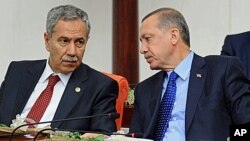Turkish President Recep Tayyip Erdogan and Deputy Prime Minister Bulent Arinc are at odds over the government's handling of peace efforts involving Kurdish militants, whose insurgency has spanned several decades. Observers say the dispute is an indication of a deepening division within the ruling AK Party.
After being told by Arinc not to talk so much, and to allow the government to run the country, Erdogan shot back on Monday, saying he would not be silenced.
Both men are founders of the ruling AK party and have been close political allies. International relations expert Soli Ozel of Istanbul’s Kadir Has University said the dispute is without precedent.
"It strikes me as pretty significant, because unlike previous occasions, Arinc did not retreat and the president doubled on what he said before. Today’s speech was also a pretty furious speech in my view. Erdogan stepped on every one of his allies; he has humiliated them," said Ozel.
Ongoing peace initiative
The deepening dispute was sparked by the government’s handling of ongoing peace efforts with the Kurdish rebel group, the PKK. Erdogan reprimanded his government, saying it was not consulting enough with him.
Even though the members all belong to the same party, political columnist Asli Aydintasbas of Turkey’s Milliyet newspaper said the dispute centers on the issue of who should run the country.
"There is a fundamental difference between how the government led by [Prime Minister] Ahmet Davutoglu sees Turkey’s administrative structure and how Erdogan sees it," said Aydintasbas.
"In Turkey formally and constitutionally, the presidency is a symbolic post; however, Erdogan feels he was elected by a popular vote, therefore he should have more say in the how the government is run. The government on the other hand - they feel Erdogan’s constant meddling is making it impossible for them to fully govern" said said Aydintasbas.
The current tensions between the president and government follow the country narrowly averting a financial crisis, after the president repeatedly attacked the central bank chief and the government for failing to cut interest rates.
The president also has clashed with Prime Minister Davutoglu over anti-corruption proposals. Expert Ozel said such actions are signs of political insecurity by the president and can be traced back to nationwide protests against him, known as the Gezi movement, when he was prime minister.
"I think he feels vulnerable since Gezi and I think his vulnerability is increasing, which is why he keeps on outmaneuvering everyone. He is the most resourceful politician around; but, he also, with every maneuvering, he is further and further cornering himself. Because he really is disrupting the normal functioning of the government, state and everything else," said Ozel.
Pending election
The tensions over the Kurdish peace process are not expected to result in its collapse or a resumption in fighting. Observers say that is because with a general election in June, neither the PKK nor the government has any interest in returning to conflict.
The hardline rhetoric of the president is widely expected to galvanize more Kurds to vote for the pro-Kurdish HDP. Columnist Aydintasbas said the ruling AK Party could pay a heavy price at June’s polls.
"The HDP is on the rise and Erdogan’s comments are helping that, that's for sure. I think they will be cost; it will be used by AKP’s opponents," said Aydintasbas.
"AKP votes already slipping there is no doubt about that and I think it furthers adds to that decline; but, don't forget Erdogan is the top vote-getter in his party all in all, and that has not changed overnight."
Observers say how well the AK Party does in the election could depend on whether Erdogan and his government can successfully persuade the electorate they share a common vision for the country.




